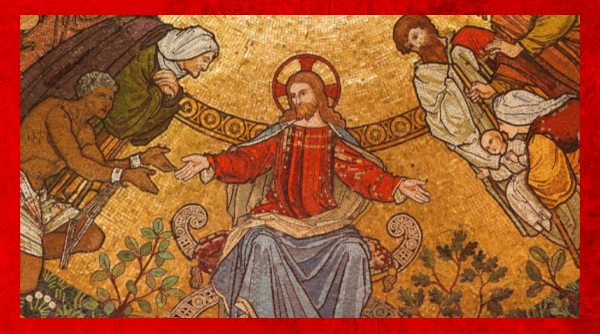The language of love

The Lord said to him: Who gives one person speech? Who makes another mute or deaf, seeing or blind? Is it not I, the Lord? Now go, I will assist you in speaking and teach you what you are to say. (Exodus 4:11-12)
A popular program used in counseling both Christian and secular is Love Languages. It is based in the belief that love is expressed in a variety of ways, and we each have our own presumption of what that is. Understanding one’s own perspective brings both self-awareness and understanding of others too. For example, some people need touch to feel loved, others need it expressed in words, and for others love is shown in actions.
Often overlooked is that cultures and generations have their own sort of ‘love language’. In past centuries, life was more fragile; a common cold could digress to pneumonia and death. A careless attitude could lead to a destructive accident. Particularly in European cultures, love was shown in the negative: not-too-fraternal correction, usually expressed in anger, because you need to know (for your own good and that of others) everything you do wrong!
This was particularly prevalent in the US until the late 20th century, forming our parents and grandparents. Thus, for the Baby Boomer generation (born 1945-1964) and their parents, love was shown by doing. The husband was to be a good provider for his family and the wife to manage the children and household with discipline. Doing one’s duty was how they expressed love. “I love you” was not commonly heard even in Christian families despite the Word of love Himself being read in these homes. These generations didn’t expect to receive love any other way.
But with post-WWII prosperity, the Boomers grew to value productivity and with it, materialism. Whereas in the past, the prominence of gift-giving may have centered in homes who enjoyed higher incomes, with American prosperity it grew to all income classes. But things, objects, can only satisfy temporarily and provide merely a faux-happiness. As people age, these do not satisfy their need for love. And when gifts, owning things, and materialism are the primary mode through which love is expressed, it should be no surprise that people fall out of love. Grasping onto a false image of love, they never really possessed it.
“Love is wrought in sacrifice, not sentiment” (Fr. Matthew Kauth, p. 153)
God, who is love, sent His only Son to personify this for us so that we would know how love looks, acts, speaks, and thinks. Ironically, as modern society became more prosperous, it grew to expect life and relationships to always be fulling. As focus turned from duty to others and instead to self-gratification, its people became more expressive of their ‘wants’ and expectations, with a perceived ‘right’ to express these as they chose. As its people grew more expressive, these expressions have become more profane. As tolerance of profanity increased, so too intolerance of the sacred.
Public profanity in the US was not well-tolerated until the late 1980’s-early 1990’s. Almost like flipping on a switch, it became mainstreamed rapidly through media and entertainment. Ever-present in the memory, it rolls out onto the tongue so frequently now that it has become standard lingo, particularly with younger generations who were raised inundated with it since conception. Older generations can remember a society in which people expressed themselves respectfully. Younger generations cannot imagine this, as their brains were not formed to conceive of it.
And profanity is extremely common even with Christians. Yet as the saints teach us, the profane and the sacred cannot co-exist. Profanity isn’t language of the heart. It is the language of hate. It prohibits dialogue and conversation.
How can we converse with God when our memory is full of profanity and the brain formed to conceive thoughts in a profane manner? If you live with someone but never truly converse with them, you are merely co-existing. To live with another one must engage with them in real language rather than slurs of speech.
The question persists: as Christians, are we living with God or merely co-existing with Him? Do we speak with Him and others in His language of love or in the profane language of the world? If our prayer and Lenten commitments have changed our heart…if mass, scriptures, and other devotions have increased our desire to know Jesus…if fasting and almsgiving have increased our compassion for others…then our heart now has greater facility to give up the profane that has seeped into it. This brings it greater capacity for love. And the language of love will then become its speech.
“Reverence is born out of fear. ‘Fear of the Lord is the beginning of wisdom’ (Proverbs 9:10). It is a kind of intellectual submission that begins to behold the infinity of God relative to one’s own finitude. It begins to behold His glory and majesty relative to one’s own derivative and dependent state.” (Fr. Matthew Kauth, p. 145)
As Easter draws near, the hope we’ve placed in our future eternity with our Heavenly Father comes alive in the resurrected Jesus. Our own transformation does not end with Lent. Rather, it has just begun in Him.
Ad Majorem Dei Gloriam 😊
(Quotes from The Imitation of Saint Joseph, TAN books, 2022)
(Image by Pixabay)

Thank you for caring and sharing appropriately...
Consecrated to the Sacred Heart of Jesus through the Immaculate Heart of Mary. Except where noted, all design, writing and images ©2024 by Debra Black and TheFaceofGraceProject.com. All Rights Reserved. No part of this website may be reproduced, distributed or transmitted in any form or by any means, including downloading, photocopying, recording, or other electronic or mechanical methods, without the prior written permission of the publisher, except in the case of brief quotations embodied in critical reviews and certain other noncommercial uses permitted by copyright law. For permission or to report violations please email: thefaceofgraceproject@gmail.com
